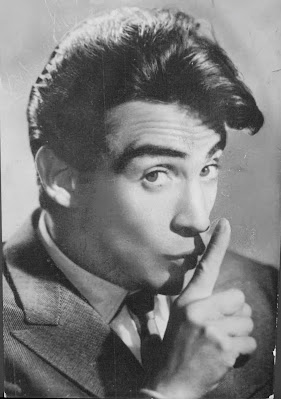Born Walter Annicchiarico in Verona to Pugliese parents on March 8, 1924, Chiari spent his teenage years excelling in sports, earning championships in boxing, bocce and swimming. During the early 1940s, he worked as a radio technician and bank clerk. While at the bank, he became known for his imitations of Adolf Hitler, which ultimately got him fired. That proved to be a blessing in disguise, motivating him to give acting a try. He started out in theater while maintaining side jobs as a cartoonist and writer.
At the start of World War II, Chiari enlisted in the Italian navy and contributed to the newspaper L’Orizzonte as a satirical cartoonist. In January 1944, he participated in an amateur stage competition in which he revived his imitation of Hitler. The performance was a hit and unofficially launched his acting career. Three years later, he landed the lead role in Enrico Scotti’s 1947 “Vanità,” and the following year, shared the screen with Alberto Sordi in Eugenio Devoto’s ensemble film, “Che Tempi.”
Chiari’s breakout role was as Alberto Annovazzi in Luchino Visconti’s 1951 “Bellissima” (Beautiful). Chiari’s breakout role was Alberto Annovazzi in Luchino Visconti’s 1951 “Bellissima” (Beautiful). The film follows Maddalena Cecconi (Anna Magnani) who answers a Cinecittà casting call for her 7-year-old daughter, Maria. After Maria wanders off, she is spotted by Alberto, a handsome, smooth-talking talent recruiter. He becomes infatuated with Maddalena and convinces her to press on with her daughter’s auditions. Through this process, their lives are turned upside down. In a mad rush to train her daughter for the stage, Maddalena schedules a photo shoot for a professional headshot, enrolls Maria in dance and acting lessons, buys her a costume and pays off Alberto, who promises favors and preferential treatment. In the end, after witnessing first-hand the lack of morals within the film industry, Maddalena learns a valuable life lesson. Chiari calls on his natural finesse and happy-go-lucky quality to charm Maddalena and to give his character an air of indifference.
Chiari appeared in numerous films and stage productions throughout the ’50s, including Mark Robson’s 1957 American romcom “The Little Hut,” which starred Ava Gardner and David Niven. Chiari and Gardner fell in love during the making of the film and began a passionate affair.
The ‘60s also proved to be a prolific decade for Chiari. Among his many successes is Dino Risi’s 1964 feel-good film, “Il Giovedi” (The Thursday). The film takes place over the course of one Thursday when Dino Versini (Chiari) spends the day with his 8-year-old son, Robertino. Having separated from the boy’s mother, Dino has not been around for much of Robertino’s life and does not really know him. The boy whose mother is of upper class, proves to be wise and worldly beyond his years, teaching his father about honesty, integrity and responsibility. That one eventful Thursday spent together transformed the lives of both father and son.
In 1969, he married actress Alida Chelli but life was about to take a dark turn. Chiari’s recreational drug use was widely known within his film circles and was overlooked because of his profession. However, that all changed on May 20, 1970 when he was arrested in Rome on charges of cocaine possession and drug trafficking. He spent 70 days in jail, missing the birth of his only child, Simone.
Chiari’s career did not rebound after his incarceration. However, he had success in an American production with Dino De Laurentiis as the executive producer. Based on the true story of mafia informant Joe Valachi, Terence Young’s 1972 “The Vallachi Papers” is a comprehensive account of the Cosa Nostra in America during the 1930s. The film boasts a spectacular international cast that includes Charles Bronson as Joe Valachi, Lino Ventura as Vito Genovese, Amedeo Nazzari as Gaetano Reina and Chiari as a hitman named Gap. The story is told from Valachi’s point-of-view as he recounts how he got involved with organized crime and the power transfers and bloodshed he witnessed along the way. Chiari is outstanding as a charming, confident jokester who becomes Valachi’s friend and confidant. His weakness for beautiful women ultimately does him in after he’s caught having an affair with the don’s wife.
Chiari continued to work in theater and film over the next two decades. He passed away on December 20, 1991 of a sudden heart attack. His son, Simone Annicchiarico, is a popular presenter and was cohost of Italy’s Got Talent.
The aforementioned films are available to stream on Amazon. Click on the titles for direct links.
Written by Jeannine Guilyard for the February 2022 issue of Fra Noi Magazine. Click here to subscribe.




Comments
Post a Comment